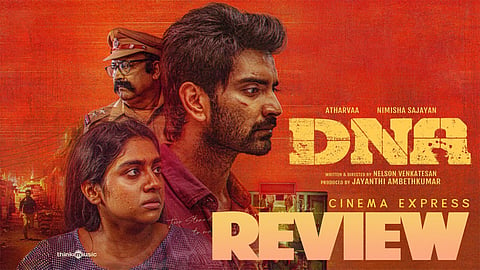DNA Movie Review: A chilling investigative drama bogged down by commercial cliches
DNA(2.5 / 5)
Tamil cinema often explores the complexities of marriage. From marital discord due to forced marriage to people falling out of love, and hoping the other one falls into love, we have seen various facets of marital life be explored in our films. And when director Nelson Venkatesan introduces a distraught Anand (Atharvaa) and a chirpy but disturbed Divya (Nimisha Sajayan) in his latest film, DNA, the stage was set for yet another exploration of two random people deciding to live their lives together. This is a space Nelson has excelled in, right from his debut film, Oru Naal Koothu, which dealt with the idea of marriage. Even in Monster, although the primary story was a man-rodent conflict, it spoke about companionship, empathy, and loneliness. And it was a culmination of all of these themes in his third film, Farhana. However, in DNA, Nelson lets go of his strong suit to put on an armour of investigative drama, and is unable to balance both with the required panache.
Director: Nelson Venkatesan
Cast: Atharvaa, Nimisha Sajayan, Mohammed Zeeshan Ayub, Balaji Sakthivel
DNA begins with a bar song about love, loss, and loneliness, and it is quite a surprising start to a Nelson film. Nevertheless, this song atleast serves the purpose of condensing Anand’s backstory into a few minutes. Soon enough, we understand why Anand is a drunkard and a druggie rolled into one, who is the poster child of infamy in a house filled with professors and researchers. But despite the seemingly educated backgrounds, they are quite regressive, and think the only way their rehabilitated son can get married is to find a girl below their ‘class’ and someone who has a ‘problem.’ And bam! We have Divya. She is said to be affected by Borderline Personality Disorder, and her parents do say she has a bunch of tablets and undergoes therapy. However, what’s disappointing is the rather one-note exploration of the disorder. And the flippant use of ‘loosu ponnu’ could have actually been excused if not for a dialogue that comes later, which goes, “Kalyanathukku apram ellaam normal aaiduchu.” It reinforces the age-old Tamil cinema trope that marriage is the solution for everything, especially mental health issues.
While these portions were concerning, the way Divya and Anand navigate their new companionship is nice to see, and once again, points to Nelson and team for condensing it all into a song. However, these are condensed not just for engagement purposes, but mainly because DNA is about infant trafficking. While there is an elaborate scene showcasing the machinations of one such gang, the focus is still on the relationship between Divya and Anand, but it makes us wait for the tonal shift. Once this happens, the film is quite compelling. Nelson keeps the emotional core strong by having the lead couple lose their child, and Anand goes in search of the same. It is through this search that Nelson weaves a rather intriguing chain of events even if they are convenient to a fault.
These investigative portions, fronted by an almost-retired cop (Balaji Sakthivel), are quite enticing as they explore the idea of the city as a labyrinth of crime where someone knows something about some incident at all times. It is almost like nothing can happen without someone outside the circle of crime being aware of the same, and yet, it happens like clockwork because that’s how the status quo of this society is maintained. Every link of this elaborate chain is aware of the magnitude of their crimes, and yet they do it without hesitation because they have made peace with it, and treat them as steps to a better life. As Anand navigates through this world, we see kidnappers, killers, criminals who maim children to make them beggars, and the sheer ordinariness of it all can be shocking. And Nelson does a decent job of showcasing this drama.
However, with too much focus on these portions, which include a couple of lengthy stunt sequences, and another bar song that serves no purpose at all, the film finds itself on sticky footing. Nevertheless, DNA is elevated by its background score that underscores the urgency in the film, even though the date ticker coming up on the screen feels obsolete after a while. But what really stands out in DNA is the earnestness of Atharvaa, who is very effective as the man torn between being a hapless father and a helpless husband. On the other end, Nimisha is shortchanged by the writing, which doesn’t give her enough and leaves her out of the narrative for too long a time.
Spending a lot of time away from the relationship drama and concentrating on the investigative thriller takes away from the final act, which suddenly shifts back to a sentimental zone. Even though Divya does have a wonderful scene involving another grieving mother, there is very little that we see of her. And when, finally, the entire climactic portion hinges on her, the emotional punch goes missing. And it doesn’t help DNA’s cause that the villain is supremely one-note, and the reasons for his crimes are not just archaic, but also unnecessarily preachy. Since monetary gains are the only reason, why discuss the God complex?
Talking about monetary gains, it is also Nelson’s most ‘commercial’ film that almost ticks all the boxes that the world believes masala films, albeit with an offbeat tough, should have. In fact, the finale felt like a revamped version of our age-old Amman films, without the necessary chutzpah, and it made me wonder if the film needed a Nelson, who didn’t stray too far away from his filmography’s DNA.

